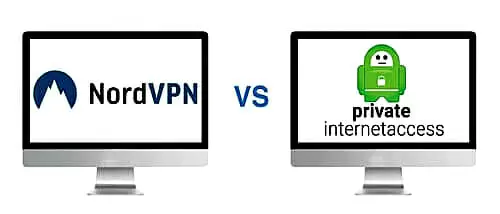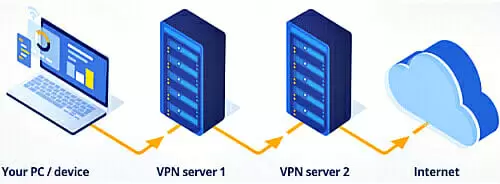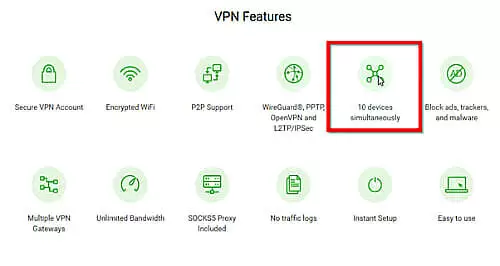When shopping for a VPN service in 2020 to help you secure your privacy, you will most likely come across NordVPN and PIA (Private Internet Access). Indeed, both of these companies are excellent and popular, hence the reason they have huge customer bases.
But in the end, you can only choose one provider, so we came up with this comparison to help you decide on what is best for you. To do so, we tested different aspects of both VPNs that are most important to consider.
Quick Overlook
Categories of VPN Tests
The tests we ran on the VPNs can be categorized as follows:
- Network speed – how fast similar servers performed compared to each other
- Available features – additional features provided by each VPN service
- Log policy and privacy – to determine if the VPN kept private data on your browsing history
- Jurisdiction – company headquarters and how it affects private data
- Security and encryption – do IP addresses or DNS requests leak?
- Connections – how may connections can be allowed simultaneously
- Price and value – how much you pay and is it worth the service?
- Apps – which company provides better apps?
- Steaming and Netflix – best service for streaming and watching Netflix
For every category we compared NordVPN and Private Internet Access, there had to be a clear winner so that we could tally the final score.
Spoiler alert: NordVPN was better than PIA in most categories and was the overall winner.
That being said, it doesn’t automatically disqualify Private Internet Access as a VPN completely. To really decide for yourself, you have to look at what’s most important to you. So, here goes…
Network Speed
This is a critical measure for any VPN because it determines the general experience while using the service. In this test, we started off with a baseline speed of 160 Mbps before activating any VPS.
Then we tested both services while switched to AES-256 encryption protocol to ensure fairness. As you shall see later, both NordVPN and PIA provide several encryption settings but, in this case, we tested the services using the best protocol.
We kicked off with NordVPN and connected to a server in New York, which yielded download speeds of slightly over 148 Mbps. This was really impressive and close to the baseline speed we started off with.
Turning to PIA, download speeds drastically dipped to slightly over 63 Mbps. This was a huge drop in speeds that was really alarming for such a major VPN service.
At this point, we were already starting to get worried about the speed difference between the two and tried several more locations. Once again, NordVPN remained fast and consistent while PIA was losing badly.
Here is another test we did, this time using NordVPN using a server in Dallas, TX. This time the download speed was even closer to the baseline speed at 149 Mbps.
We then tried to test another US server for PIA, this time in Chicago, and the download speed was much lower at 66 Mbps.
At this point, it was very clear NordVPN had the upper hand in speed, at least in the US, so we looked at servers in Europe. In the UK, download speed using NordVPN was surprising because it was the same as the baseline speed at 150 Mbps.
Results
Did PIA redeem itself in the UK? No, absolutely not. Download speeds were once again lower than the competition at 65 Mbps.
After all this, it was very clear that NordVPN was out-speeding Private Internet Access consistently. The only question we had was why, and we chalked up the difference to a higher number of servers by the former.
NordVPN has a lot more servers than PIA, with the former having 5,578 servers in 59 countries while PIA has 3,292 servers in 46 countries. More servers mean that the load on each server is shared allowing for faster transfer speeds with no cap on bandwidth.
Therefore, the winner in terms of network speed is NordVPN… by a huge margin.
Available Features
VPN services are constantly trying to outdo each other, and one way to come out on top is to offer more features than the competition. To this end, NordVPN and PIA have gone the extra mile to include some very interesting features.
Common Features
Some of the common features you will find in both services and other popular ones like ExpressVPN include:
Onion Routing
Access to the dark web is only possible using the onion technique, which is not possible in most web browsers. Tor browser is one of the few that can do it, but your VPN must also allow for onion routing.
NordVPN and PIA all allow the use Tor browser, but NordVPN also has servers specially designed for this purpose. Thanks to this, you can elect to have all your data automatically routed using the onion technique for even more privacy and security.
Ad Blocking
Ads also take up valuable transfer speed, so it makes sense that VPNs would block ads to increase overall speed. There are also other reasons to block ads, though, such as security and privacy.
Advertisers use ads to track a user’s browsing activities while hackers use them to implant malware and also collect personal information. Either way, it’s best to block all ads completely.
NordVPN uses the feature CyberSec to block ads while PIA introduced MACE for the same purpose.
Different Encryption Settings
There are many different encryption techniques used to protect a user’s data and each technique has its particular benefits and drawbacks. For example, AES-256 encryption is the best for security, but it does lower network speeds.
Rather than force anyone to use one type of encryption, both NordVPN and PIA allow users to select different encryption settings to suit their needs. When you need more speed, for instance, you can completely opt-out of data encryption.
Unique Features
Besides the above unique features, NordVPN has an upper hand over Private Internet Access because it also includes double encryption. Once your data has been encrypted, it is sent through yet another server for the second round of encryption.
NordVPN also makes use of obfuscated servers to beat systems that block VPNs. The reason why the Great Firewall of China still exists despite the presence of VPNs is because the government actively blocks IP addresses associated with VPN servers.
An obfuscated server encrypts data but thereafter makes it seem like it’s just like any other data traffic and not from a VPN. This is incredibly useful in accessing any websites, ISPs, and even governments that block VPNs such as China described above.
Because of the additional features that make NordVPN unique compared to PIA, NordVPN is the winner here too.
Log Policy
Most companies eventually have to face off government institutions regarding users’ privacy and their personal data. The famous case between Apple and the FBI in 2016 highlighted the quandary, raising the question of anonymity and privacy with the use of VPNs.
PIA is based in the US, and as such has been subpoenaed by US Law courts to provide user data. In response, PIA only provided its own servers’ IP addresses and argued that it could not provide private IP addresses because it simply did not keep that information.
In 2016, PIA had to shut down its Russian operations since the country mandated that all providers keep user logs for up to a year. Private Internet Access made a stand that clearly indicated they do not keep user logs and would prefer to maintain its users’ anonymity.
Privacy and Jurisdiction
However, it is important to note that PIA was acquired by Kape Technologies and now renamed to the Private Internet. Before being Kape Tech., it was Crossrider. Part of the reason for renaming was to distance the company from its shady past, which even CEO Ido Ehrlichman admitted in a 2018 interview.
Crossrider had the reputation of creating malware and adware through which advertisements would be pushed to end-users. Now that PIA is owned by Private Internet, it’s a question whether the VPN will still remain as secure as it is today.
Meanwhile, NordVPN has not had to deal with any legal cases regarding user data since it is based in Panama. The country is not part of the global surveillance program; thus, it means you can feel more secure.
Nevertheless, NordVPN has had independent audits by PWC in Switzerland to confirm that there are no logs. The audit proved that NordVPN really doesn’t keep logs, just as PIA.
Given that neither of the companies keeps user logs, there can be no winner here, hence the category is a tie.
Security and Encryption
The only way to be sure about privacy is to encrypt data so that not even the most powerful supercomputer can crack it. One of the strongest encryption ciphers is AES-256, which would require millions of years to crack even by the fastest supercomputer.
Both NordVPN and PIA make use of this encryption cipher, meaning that your data is completely secure when browsing the internet. For further verification, both VPNs use SHA-256 authentication and an RSA-4096 handshake.
For those who don’t understand what all these abbreviations mean – it means very secure from attacks and/or tapping.
Even so, your data and identity may be exposed if you lose your connection to the VPN server. That is why a kill switch is also implemented by both services. This feature instantly cuts off the connection in such a case and only reconnects when a secure connection to the server is re-established.
Leaks may also occur that expose your IP address, particularly if DNS requests are not masked properly. Once again, both services are excellent at preventing any leaks whatsoever to ensure total security.
It would appear we may have another tie, but the fact that NordVPN does double encryption makes it a winner in this category.
Connections
What would be the point of having a secure internet connection on your desktop and not your mobile phone? VPN providers understand that everyone now has at least 2 devices they use to browse the internet and therefore provide multiple connections for each device.
NordVPN allows you to connect up to 6 devices simultaneously using one account, while PIA has a limit of 10 devices. Some might argue that it is pointless to have over 5 connections available, but we believe that more is always better… at least in this case.
In most cases, popular VPNs in 2020 like ExpressVPN allow up to 5 devices, while some go as high as 10 in the case of IPVanish or Private Internet Access above.
For this reason, Private Internet Access wins in a number of internet connections allowed.
Apps
Most people today access the internet on their phones, but there are plenty of other devices that connect to the internet. Therefore, it is important for a VPN to cater to all these devices while keeping them as easy to use as possible.
NordVPN provides desktop apps for PC, Mac and Linux, mobile apps for iOS and Android, web browser addons for Chrome and Firefox, and also an app for Android TV. PIA has a similar line-up of apps, perhaps with the exception of Android TV.
We realize that this is quite a bit of nitpicking, so we are going to leave this category as a tie too.
Streaming and Netflix
Many streaming services place restrictions on their users based on geographic location. For instance, we cannot stream BBC iPlayer from the US due to these restrictions. A VPN can bypass these problems if it happens to have a server in the service’s location.
There is a clear-cut winner here that is NordVPN simply because PIA does not allow Netflix streaming. It is unfortunate for PIA not to allow these services because it is usually a major concern for users.
Price and Value
Finally, we come down to value for money, because sometimes even a good service can be too costly to be worth it. To compare the two services, we had to look at the entire pricing plan for each service.
NordVPN
The monthly cost is $11.95, which is consistent with the market average, although slightly higher. You can get lower pricing, though, if you subscribe to a longer plan as indicated below.
Private Internet Access
You are required to pay $9.95 every month to PIA for the service, which is slightly lower than the price at NordVPN. But similar to the latter, you can pay less if you subscribe to a long-term plan of 6 months or 2 years as indicated below.
It is also important to note that PIA also has other offers like accepting gift cards, whereas NordVPN does not do so.
Which One Is More Valuable?
In general, it appears that PIA is cheaper than NordVPN at all levels. But considering the many features included in NordVPN’s service, it makes the slightly higher price worth it.
The good news for you is that you can try both services for 30 days to start with because of the guaranteed 30-day money-back policies. It should give you time to test everything for yourself and make a decision for yourself.
For being cheaper, PIA becomes the winner in pricing, although the value is a very subjective matter.
Final Verdict
After considering all the above, we can summarise the comparison in this table below:
| VPN Service | Winner |
| Network speed | NordVPN |
| Available features | NordVPN |
| Log policy and privacy | Tied |
| Jurisdiction | NordVPN |
| Security and Encryption | NordVPN |
| Connections | Private Internet Access |
| Apps | Tied |
| Streaming and Netflix | NordVPN |
| Price and value | Private Internet Access |
From the above, we can confidently claim that NordVPN is the winner in this comparison against Private Internet Access. In the 9 categories assessed, NordVPN won in 5 categories while PIA took only two. No doubt, NordVPN is the superior VPN service.


